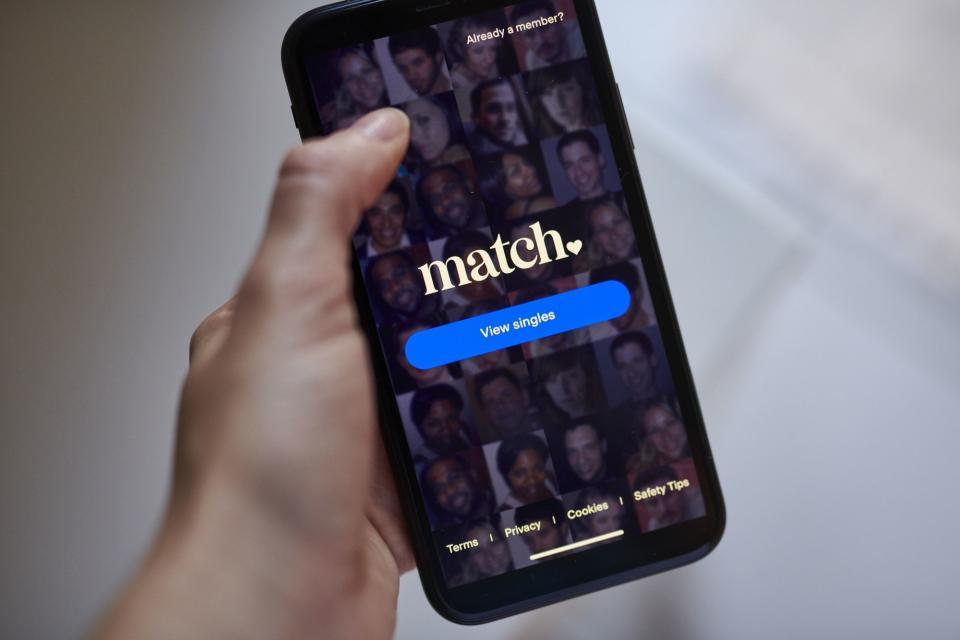Match Drops After Sales Forecast Falls Short on Slow Growth
(Bloomberg) -- Match Group Inc. gave a forecast for revenue in the current quarter that fell far short of analysts’ estimates with growth stymied by continuing fallout from Covid-19 and a strong dollar weighing on overseas sales. The shares fell more than 20% in extending trading.
Most Read from Bloomberg
R Kelly Has $28,000 in His Prison-Inmate Account. Prosecutors Want to Seize It
Tax Bill Latest: GOP Private Equity Carveout Amendment Approved
Winners and Losers in Democrats’ Signature Tax and Energy Bill
US Inflation Peak in Sight But Debate Rages Over What Comes Next
Sales will be $790 million to $800 million in the quarter ending in September, said the Dallas-based company, which is parent to dating apps including Tinder, OkCupid and Hinge. Analysts, on average, estimated $883.6 million, according to data compiled by Bloomberg. The company said currency fluctuations would have an 8 percentage point effect on revenue.
“Although the overall market opportunity remains substantial, the current environment is presenting some unique trends related to consumer behavior,” Chief Executive Officer Bernard Kim said Tuesday in a letter to shareholders. “While people have generally moved past lockdowns and entered a more normal way of life, their willingness to try online dating products for the first time hasn’t yet returned to pre-pandemic levels.”
Match has faced multiple challenges this year, including a senior leadership change, a legal battle with Alphabet Inc. over the Google Play Store, lagging growth due to Covid-19 restrictions and currency fluctuations hurting overseas revenue. Kim replaced Shar Dubey as CEO after she stepped down at the end of May. Dubey served various roles at Match over 16 years, leaving shortly after the company missed first-quarter revenue estimates and announced a round of share buybacks.
Match also announced Tuesday that Renate Nyborg was leaving as chief executive officer at Tinder, the largest unit and the most popular dating app in the US. The company is searching for a permanent replacement, Kim said.
“We need some time for the new Tinder team to improve execution and see how they deliver on their product road map,” Kim said in the letter. “We’re optimistic that the changes we’ve made at Tinder will lead to improved product execution and velocity, monetization wins and enhanced user growth.”
Direct revenue from Tinder increased 13% in the quarter, Match said. But the company intends to pull back on “Tinder Coins,” an in-app virtual currency used to provide benefits to users and encourage more spending. “We also intend to do more thinking about virtual goods to ensure that they can be a real driver for Tinder’s next leg of growth and help us unlock the untapped power” of the platform, Kim said.
Match has been expanding its presence abroad too, with Hinge’s launch in Germany and the acquisition last year of South Korean video conferencing company, Hyperconnect. The company expects Hinge to contribute $300 million in revenue this year, which is about a 50% increase from 2021. The app will launch elsewhere in Europe and in India in the upcoming quarters, Match said.
“The largest untapped market opportunity for us is in APAC,” Kim said, adding that payer growth in the region should be fueled by Hyperconnect.
Still, Match said it’s seeing “weakness” in its live streaming business and a rise in Covid cases has blunted momentum particularly in Japan.
The shares fell to a low of $58.03 in extended trading after closing at $76.71 in New York. The stock has plunged 42% this year, compared with a 6.3% gain for rival Bumble Inc.
Companies including Microsoft Corp. and Netflix Inc. have cited currency fluctuations for reduced revenue. Match said that it has seen a $74 million revenue headwind to date.
In the second quarter, Match reported revenue increased 12% to $795 million, compared with the average analyst estimate of $804.1 million. Paying users grew 10% to 16.4 million, falling short of the 16.5 million average estimate.
Match reported a net loss of $32.4 million, or a loss of 11 cents a share, compared with net income of $140.5 million, or 46 cents a share, in the period a year earlier.
(Updates with details on Tinder in the seventh paragraph.)
Most Read from Bloomberg Businessweek
A Very Dangerous Place to Be Pregnant Is Getting Even Scarier
IVF Patients Are Trapped in Limbo and Bracing for the Next Post-Roe Fight
Podcast Guests Are Paying Up to $50,000 to Appear on Popular Shows
©2022 Bloomberg L.P.


